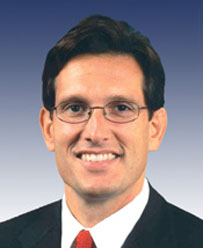For all of the bluster about not raising taxes, a group of House Republicans have proposed doing what one telecom organization concludes is exactly that by diverting Universal Service Fund revenue paid by landline and cell phone customers to reduce the budget deficit.
The idea to divert at least $1 billion annually — about 25% of the USF budget, comes from House Majority Leader Rep. Eric Cantor (R-Va.). USF fees are paid by consumers as part of their telephone bill.
With nearly a quarter of the USF’s $4.5 billion annual revenue diverted to the treasury, phone companies would either have to curtail efforts at rural broadband expansion, now proposed under USF reform efforts, or lobby for an increase in the amount of the fee to cover the diverted shortfall.
Telecom industry groups representing rural phone companies and local utility regulators blasted the proposal, saying it would destroy rural broadband expansion efforts underway by small independent and co-op phone companies. The Universal Service Fund was designed to subsidize phone service in rural America to ensure equality of access and rates regardless of where Americans live. Without it, many rural phone companies face serious financial difficulties, especially as consumers increasingly look to providers to deliver broadband service.
 “While we understand Congress is scrambling to resolve the deficit issue, our lawmakers should not tap into the Universal Service Fund as a last-minute solution. To divert these vital but limited funds from their intended use would be counterproductive and may undermine our national broadband goals,” said National Association of Regulatory Utility Commissioners president Tony Clark. “The Universal Service Fund is funded by fees consumers pay through their telephone company to ensure affordable access to telecommunications service across America. The Universal Service Fund receives no federal monies and should not even be under consideration in this debate.”
“While we understand Congress is scrambling to resolve the deficit issue, our lawmakers should not tap into the Universal Service Fund as a last-minute solution. To divert these vital but limited funds from their intended use would be counterproductive and may undermine our national broadband goals,” said National Association of Regulatory Utility Commissioners president Tony Clark. “The Universal Service Fund is funded by fees consumers pay through their telephone company to ensure affordable access to telecommunications service across America. The Universal Service Fund receives no federal monies and should not even be under consideration in this debate.”
 John Rose, president of the Organization for the Promotion and Advancement of Small Telecommunications Companies (OPASTCO), called Cantor’s proposal “a totally new tax.”
John Rose, president of the Organization for the Promotion and Advancement of Small Telecommunications Companies (OPASTCO), called Cantor’s proposal “a totally new tax.”
The Federal Communications Commission has been working with state and local regulators, members of Congress, and rural telephone interests to transition the fund away from subsidizing basic telephone service, which is now ubiquitous in the United States, and towards a general purpose broadband rollout fund, to help provide capital to expand broadband service into communities deemed by larger providers as unprofitable to serve.
Some critics of the program suggest in its present form, it suffers from waste, fraud, and abuse. Rep. Cliff Stearns (R-Fla.) noted the original fund charged consumers less than five percent of their long distance bill, but subsequent increases have resulted in consumers paying up to 14%. Stearns said more must be done to reduce the cost of the USF for consumers and has supported prior reform efforts.
[flv width=”640″ height=”500″]http://www.phillipdampier.com/video/Universal Service Fund – Cliff Stearns 11-18-09.flv[/flv]
Rep. Cliff Stearns (R-Fla.)’s opening remarks in a 2009 hearing criticize the increasing costs consumers find on their phone bills for the Universal Service Fund. (5 minutes)


 Subscribe
Subscribe
